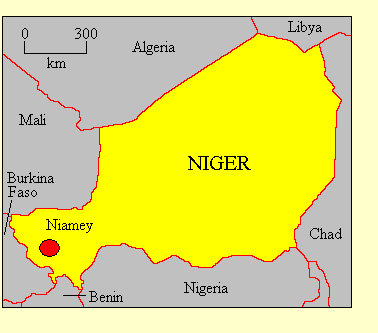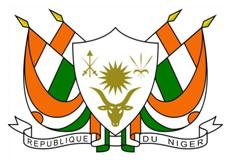

REPUBLIC OF NIGER
• Official name: Republique de Niger (Republic of Niger)
• Location: West Africa
• International organisations: African, Caribbean and Pacific Group of States, African Union,
Non-Aligned Movement, Organisation Internationale de la Francophonie, Organisation of Islamic
Conference, United Nations, World Trade Organisation
• Borders: Algeria, Benin, Burkina Faso, Chad, Libya, Mali, Nigeria
• Coastline: None
• Land area: 1,267,000 Km2
• Population: 15,300,000
• Annual GDP (PPP) per capita: US$700 (2009 CIA estimate). World ranking: 188
• Ethnicity: Almost the entire population is of Sudanic and Berber stock. The
largest groups are the Hausa (56%), Djerma (22%), Fula (8.5%) and Tuareg (8%).
• Languages: French is the official language. The majority of the population speak
Hausa and related African languages.
• Religion: 80% of the population are Sunni Moslems, and most of the rest follow
indigenous beliefs.
• Form of government: Presidential democratic republic. Niger is divided into seven departments
and one capital city district.
• Capital: Niamey
• Constitution: The
Constitution of the Republic of Niger came into effect in January 1993, but was
substantially amended by referendum in 1999.
• Head of state: The President, elected by direct universal suffrage for a five-year term.
• Head of government: The President, who appoints all ministers.
• Legislature: Niger has a unicameral legislature. The National Assembly (Assemblee Nationale) has 83
members elected for five-year terms, 75 elected from multi-member constituencies and
eight elected to represent national minorities.
• Electoral authority: The National Independent Election Commission (CENI) administers
national elections.
• Freedom House 2011 rating: Political Rights 5, Civil Liberties 4
• Transparency International Corruption Index: 26% (123 of 178 countries rated)
• Reporters Without Borders Press Freedom 2010 Index: 71.5% (104 of 178 countries rated)
• Heritage Foundation Economic Freedom 2010 Index: 54.3% (126 of 178 countries rated)
Political history
Until the 19th century the territory which is now Niger was ruled by various Hausa
and Fulani states in northern Nigeria. It was
penetrated by the French in the 1880s and formally annexed in 1900. Niger became a
separate colony in 1922. Along with the rest of French West Africa, it became self-
governing within the French union in 1958 and independent in 1960.

The nationalist leader Hamani Diori became President, and ran a fairly mild
version of the African one-party state system. The country was devastated by drought
in the early 1970s, and this led directly to the 1974 coup which deposed Diori and
brought a military regime to power.
Niger was then ruled by Seyni Kountché until his death in 1987. Under his
successor, Ali Saibou, a new constitution was adopted in 1992, but President Mahame
Ousmane was deposed in a second military coup in 1996. The military ruler
Ibrahim Bare Mainassara was assassinated in 1999. This allowed a return to democratic
government under a new Constitution.
Tandja Mamadou was elected President in 1999 and re-elected in 2004, in elections generally held to be
free and fair. The 1999 Constitution barred him from a third term, and also made it illegal
to try to alter this constitutional provision. In May 2009 the Constitutional Court ruled
that Tandja could not hold a referendum on allowing him to run for a third term. In June Tandja therefore seized
power and
declared the constitution suspended and the Court abolished. The referendum was then held, but
it had no constitutional valdity and was marked by very low turnout. Tandja declared his
own term extended until 2012, but in February 2010 the army stepped in and deposed him. The
military junta headed by Salou Djibo announced
that it would return Niger to democratic rule. It honoured this pledge, and in reasonably free elections
in January and March 2011 the veteran oppositionist
Mahamadou Issoufou was elected president.
Before Tandja's coup the dominant political party was his National Movement for the
Development Society. The main opposition parties were Issoufou's Nigerien
Party for Democracy and Socialism and the Democratic and Social Convention.
Freedom House's 2011
report on Niger
(which was written before the 2011 elections) says: "Niger is not an electoral democracy. While observers
considered the national polls held in 1999 and 2004 to be largely free and fair, President Mamadou Tandja's
unconstitutional moves to extend his rule in 2009 dismantled much of the country's democratic progress, and the
2010 coup increased the military's control over government... The opposition openly welcomed the February 2010
coup as an opportunity to advance democratic development... Corruption is a serious problem in Niger, and observers
have raised transparency concerns regarding uranium mining contracts... In 2010, the transitional government made
efforts to restore freedoms of speech and of the press... Constitutional guarantees of freedoms of assembly and
association are largely upheld, but authorities have restricted the operations of some nongovernmental
organisations... The constitution provides for an independent judiciary, and courts have shown some autonomy in the
past, though the judicial system is overburdened and has been subject to executive and other interference."
Updated November 2011
|

